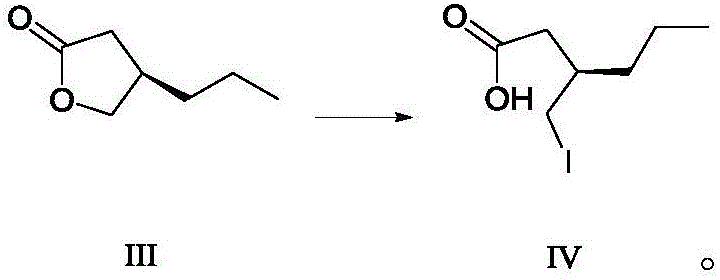Preparing method for caproic acid derivative
A derivative, hexanoic acid technology, applied in the field of preparation of hexanoic acid derivatives, can solve the problems of cumbersome post-processing steps, unsuitable for industrial production, long reaction steps, etc.
- Summary
- Abstract
- Description
- Claims
- Application Information
AI Technical Summary
Problems solved by technology
Method used
Image
Examples
Embodiment 1
[0068]
[0069] Dissolve (R)-3-methoxycarbonylhexanoic acid (174.1g, 1mol, ee value 99.2%) in 500mL of methanol, cool down to 0°C, add 500mL of water, cool to 0°C, add powdered chlorine Calcium chloride (115.8 g, 1.1 mol) and sodium borohydride in ethanol (2M, 800 mL). The reaction solution was stirred overnight (about 12 hours) at room temperature (20°C-30°C), then quenched by adding hydrochloric acid (6M, 1000mL), concentrated under reduced pressure, diluted with 500mL of water, extracted with dichloromethane (3×150mL), The organic phases were combined, dried over anhydrous sodium sulfate, filtered, and concentrated under reduced pressure to obtain 108.9 g of Buvaracetam intermediate III, yield 85.0%, purity: 97.2% (GC)
[0070] R-3-methoxycarbonylhexanoic acid can be prepared according to the method described in Angewandte Chemie International Edition, 1998, 37(13-14), 1931-1933, and the ee value is greater than 99.0%.
Embodiment 2
[0072]
[0073] Under the protection of nitrogen, dissolve Buvaracetam Intermediate III (128.1g, 1mol) in 1L of dichloromethane, cool down to 0°C, add iodotrimethylsilane (150mL), and the reaction solution is heated at 20-30°C Stir for 2 hours. Then add hydrochloric acid solution (1M, 800mL) and sodium thiosulfate aqueous solution (mass percentage is 10%, described mass percent refers to the percentage of the quality of sodium thiosulfate and sodium thiosulfate aqueous solution gross mass, 400mL) successively. , the aqueous phase was extracted with 1 L of dichloromethane, the organic phase was washed twice with saturated brine, dried over anhydrous sodium sulfate, filtered, and concentrated under reduced pressure to obtain hexanoic acid derivative IV (254.6 g, 99.5%) with a yield of 99.5%. Purity: 95.6% (GC).
Embodiment 3
[0075]
[0076] Under the protection of nitrogen, dissolve hexanoic acid derivative IV (1280.4g, 4mol) in 1500mL of toluene, slowly add thionyl chloride (951.8g, 8mol), and stir the reaction solution at room temperature (20°C-30°C) for 24 hours , and the solvent was concentrated under reduced pressure. The residue was rectified under vacuum pump (0.32 mmHg, 90-95° C.) to obtain 1310 g of light yellow transparent liquid Compound V.
[0077] 1310 g of the obtained compound V was dissolved in 2.5 L of dichloromethane solution. Subsequently, the above solution was added to a mixture containing L-2-aminobutyramide hydrochloride (428.9g, 4.2mol), 4A molecular sieves (500g), potassium hydroxide (500g), anhydrous sodium sulfate (500g), tetrabutyl bromide In dichloromethane solution (12.5L) of ammonium (49g, 0.14mol), the reaction solution was stirred at 20-30°C for 18 hours, then filtered with diatomaceous earth, and the filtrate was concentrated to dryness under reduced pressure ...
PUM
 Login to View More
Login to View More Abstract
Description
Claims
Application Information
 Login to View More
Login to View More - R&D
- Intellectual Property
- Life Sciences
- Materials
- Tech Scout
- Unparalleled Data Quality
- Higher Quality Content
- 60% Fewer Hallucinations
Browse by: Latest US Patents, China's latest patents, Technical Efficacy Thesaurus, Application Domain, Technology Topic, Popular Technical Reports.
© 2025 PatSnap. All rights reserved.Legal|Privacy policy|Modern Slavery Act Transparency Statement|Sitemap|About US| Contact US: help@patsnap.com



